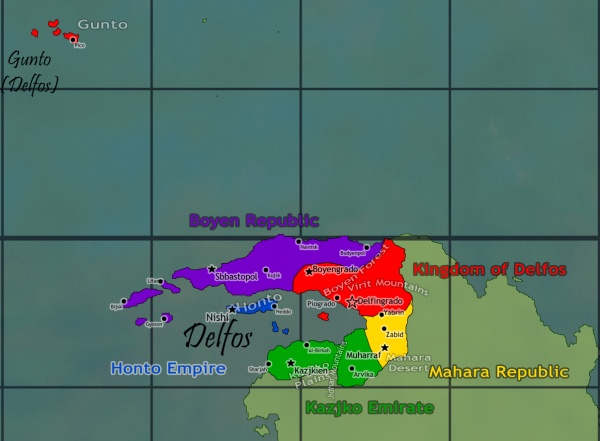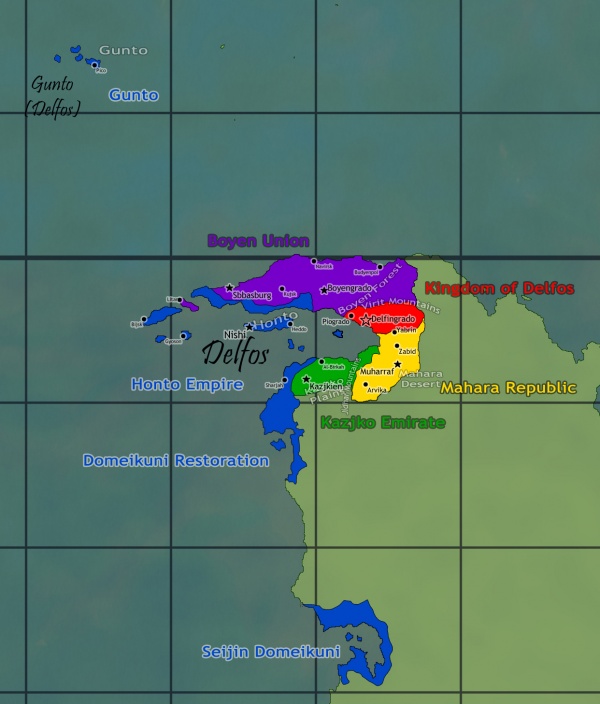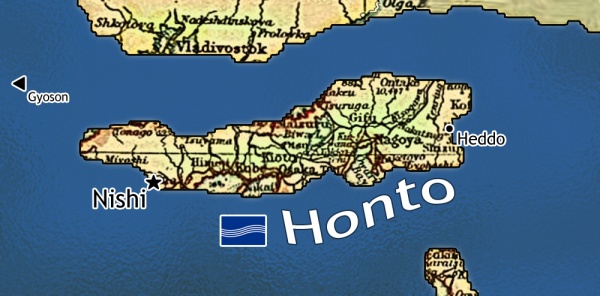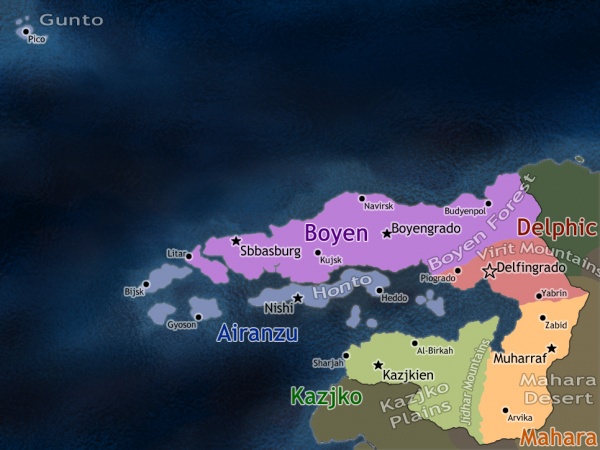Difference between revisions of "Honto"
| Line 9: | Line 9: | ||
|} | |} | ||
|- | |- | ||
| − | | align=center colspan=2 | | + | | align=center colspan=2 | Unsinkable Ship |
|- | |- | ||
| '''Map''' || [[File:Honto_map.jpg|100px]] | | '''Map''' || [[File:Honto_map.jpg|100px]] | ||
|- | |- | ||
| − | |'''Official Language''' || < | + | |'''Official Language''' || Nichibotsu<br> (2nd)Delphic |
| − | + | ||
| − | + | ||
|- | |- | ||
|'''Ethnicities''' || 90% Seijin | |'''Ethnicities''' || 90% Seijin | ||
|- | |- | ||
| − | |'''[[Wikipedia:Capital|Capital]]''' || | + | |'''[[Wikipedia:Capital|Capital]]''' || Nishi |
|- | |- | ||
| − | |'''President of | + | |'''President of Honto and Airanzu Region''' || [[Ryo Kurokawa]] |
|- | |- | ||
| − | |'''President of the Parliament''' || | + | |'''President of the Airanzu Parliament''' || Atsuhito Daigo |
|- | |- | ||
|'''Area''' || <amount> km2 | |'''Area''' || <amount> km2 | ||
|- | |- | ||
|'''[[Population]]''' <br> - Total (February 2015)<br> - Density | |'''[[Population]]''' <br> - Total (February 2015)<br> - Density | ||
| − | | 50 Million | + | | 50 Million<br> 180/km2 |
|- | |- | ||
|'''Government Type''' | |'''Government Type''' | ||
| Line 49: | Line 47: | ||
| '''[[Wikipedia:National_anthem|National Anthem]]''' || Sunset over blue | | '''[[Wikipedia:National_anthem|National Anthem]]''' || Sunset over blue | ||
|- | |- | ||
| − | | '''Internet [[TLD]]''' || . | + | | '''Internet [[TLD]]''' || .hon |
|- | |- | ||
| '''[[Wikipedia:List_of_country_calling_codes|Calling Code]]''' || 351 | | '''[[Wikipedia:List_of_country_calling_codes|Calling Code]]''' || 351 | ||
| Line 58: | Line 56: | ||
== History == | == History == | ||
| − | Honto, the Main Island of the Delphic Bay has been populated since the establishment of the Indo-Phoenixian people and has always been regarded as a focal point of the Seijin ethnology. (to be concluded) | + | === Early History === |
| + | Honto, the Main Island of the Delphic Bay has been populated since the establishment of the Indo-Phoenixian people and has always been regarded as a focal point of the Seijin ethnology in Phoenixia. | ||
| + | Although Seijin Bay is regarded as the oldest settlement of the early Seijin in Phoenixia, excavations in Honto have revealed earthenware more than 10000 years old, predating the arrival of Suna-Khemish influences by at least 5 thousand years. | ||
| + | |||
| + | Honto is first mentioned in Delphic-Suna tablets dating 2000BC over trade and also suggesting that Honto was culturally dominated by Illidian Period of the early Mahara-Suna civilization. | ||
| + | |||
| + | (to be concluded) | ||
=== Honto Empire === | === Honto Empire === | ||
| Line 64: | Line 68: | ||
[[File:Endof1800dephicbay.jpg|600px]] | [[File:Endof1800dephicbay.jpg|600px]] | ||
| − | At second half of the 1800s, two centuries of civil wars and isolationist policies had forced many Seijin territories, known as Domeikuni (Allied Countries) to the Honto Feudalism system, to cut ties with Honto. The political differences between the Domeikuni and Honto had reached a limit, many former allies siding with the closer and extremely progressive Boyen Republic (the result of the Alliance of Delphic Free States). The young | + | At second half of the 1800s, two centuries of civil wars and isolationist policies had forced many Seijin territories, known as Domeikuni (Allied Countries) to the Honto Feudalism system, to cut ties with Honto. The political differences between the Domeikuni and Honto had reached a limit, many former allies siding with the closer and extremely progressive Boyen Republic (the result of the Alliance of Delphic Free States). The young [[Empress Ichijo]] at the time decided, together with the inner council (later known as Restoration Council) and Ozian diplomats, to take over and reform Honto to Domeikuni, ending the Taikun rule of Fushimi and installing a modern government, taking part of the rising industrialization, sent their brightest to the [[Delphic Association of Craftsmen]], and secured trade deals with Ozia, starting the Restoration Era of the Honto Empire. |
| − | [https://upload.wikimedia.org/wikipedia/commons/5/5b/JBMikasa.jpg|Battleship Mikasa] | + | [https://upload.wikimedia.org/wikipedia/commons/5/5b/JBMikasa.jpg | Battleship Mikasa] |
[[File:Delphicbay1920.jpg|600px]] | [[File:Delphicbay1920.jpg|600px]] | ||
The | The | ||
| + | |||
| + | (to be concluded) | ||
== GEOGRAPHY == | == GEOGRAPHY == | ||
Revision as of 09:08, 8 August 2015
| |||||
| Unsinkable Ship | |||||
| Map | | ||||
| Official Language | Nichibotsu (2nd)Delphic | ||||
| Ethnicities | 90% Seijin | ||||
| Capital | Nishi | ||||
| President of Honto and Airanzu Region | Ryo Kurokawa | ||||
| President of the Airanzu Parliament | Atsuhito Daigo | ||||
| Area | <amount> km2 | ||||
| Population - Total (February 2015) - Density |
50 Million 180/km2 | ||||
| Government Type | Parliamentary | ||||
| Nation Type | Democratic Republic (Federated) | ||||
| National Symbols | White Waves | ||||
| Currency | delf (Federal Currency) | ||||
| Pronunciation | Hon-toh | ||||
| Naval Craft Classification | HDS / NDS | ||||
| National Anthem | Sunset over blue | ||||
| Internet TLD | .hon | ||||
| Calling Code | 351 | ||||
Contents
[hide]- 1 History
- 2 GEOGRAPHY
- 3 PEOPLE
- 4 GOVERNMENT
- 4.1 Country Name
- 4.2 Government Type
- 4.3 Capital
- 4.4 Administrative Divisions
- 4.5 Creation
- 4.6 National Holidays
- 4.7 CONSTITUTION
- 4.8 Anthem
- 4.9 Suffrage
- 4.10 Executive Branch
- 4.11 Legislative Branch
- 4.12 Judicial Branch
- 4.13 Political Parties
- 4.14 Political Pressure Groups
- 4.15 International Organization Participation
- 4.16 Flag Description
- 5 ECONOMY
- 6 COMMUNICATIONS
- 7 TRANSPORTATION
- 8 MILITARY
- 9 TRANSNATIONAL ISSUES
History
Early History
Honto, the Main Island of the Delphic Bay has been populated since the establishment of the Indo-Phoenixian people and has always been regarded as a focal point of the Seijin ethnology in Phoenixia. Although Seijin Bay is regarded as the oldest settlement of the early Seijin in Phoenixia, excavations in Honto have revealed earthenware more than 10000 years old, predating the arrival of Suna-Khemish influences by at least 5 thousand years.
Honto is first mentioned in Delphic-Suna tablets dating 2000BC over trade and also suggesting that Honto was culturally dominated by Illidian Period of the early Mahara-Suna civilization.
(to be concluded)
Honto Empire
At second half of the 1800s, two centuries of civil wars and isolationist policies had forced many Seijin territories, known as Domeikuni (Allied Countries) to the Honto Feudalism system, to cut ties with Honto. The political differences between the Domeikuni and Honto had reached a limit, many former allies siding with the closer and extremely progressive Boyen Republic (the result of the Alliance of Delphic Free States). The young Empress Ichijo at the time decided, together with the inner council (later known as Restoration Council) and Ozian diplomats, to take over and reform Honto to Domeikuni, ending the Taikun rule of Fushimi and installing a modern government, taking part of the rising industrialization, sent their brightest to the Delphic Association of Craftsmen, and secured trade deals with Ozia, starting the Restoration Era of the Honto Empire.
The
(to be concluded)
GEOGRAPHY
- Honto is the "Main Island" of the Delphic Bay, it has temperate cool mountains and temperate grasslands around them.
Location
Honto is located in the middle of the Delphic Bay and is part of the Airanzu Region of New Delfos.
PEOPLE
Seijin (to be concluded)
Population
50 Million
Nationality
Noun:
Adjective:
Ethnic Groups
Seijin
Religions
Languages
Nichibotsu Delphic
GOVERNMENT
Country Name
Conventional Long Form:
Conventional Short Form:
Abbreviation:
Government Type
Capital
Name: Nishi
Administrative Divisions
Creation
National Holidays
CONSTITUTION
Anthem
Suffrage
Executive Branch
Head of State:
Head of Government:
Cabinet:
Elections:
Legislative Branch
Judicial Branch
Political Parties
Political Pressure Groups
International Organization Participation
United Axis of Socialist States [[1]]
Flag Description
ECONOMY
Steadystate Tracker[2]
Economy Overview
Labor Force by Occupation
Exports-commodities
Exports-partners
Imports-commodities
Common
Rare
Imports-partners
Currency Code
Fiscal Year
COMMUNICATIONS
Telephones-main lines in use
Telephones-mobile cellular
Radio Broadcast Stations
AM , FM , shortwave
Television Broadcast Stations
Internet Country Code
Internet Hosts
Internet Users
TRANSPORTATION
Airports
Airports-with paved runways
total:
over 3,047 m:
2,438 to 3,047 m:
1,524 to 2,437 m:
914 to 1,523 m:
under 914 m:
Airports-with unpaved runways
total:
1,524 to 2,437 m:
914 to 1,523 m:
under 914 m:
Pipelines
gas km; oil km
Railways
total: km
standard gauge: km
maglev: km
note: maglev is planned to replace standard gauge entirely by 2050.
Roadways
total: km
paved: 5 km (including 638 km of expressway)
unpaved: km
Waterways
km
Merchant Marine
Total: ships
By Type:
bulk carrier
cargo
chemical tanker
passenger
petroleum tanker
refrigerated cargo





